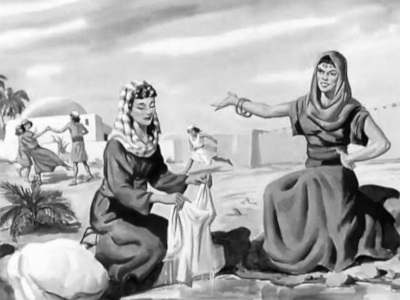Spiritually Dull
© 05.11.19 David Eric Williams
 In the first couple chapters of 1 Samuel we encounter an interesting vignette of family life in ancient Israel. The text introduces us to Elkanah, Peninnah and Hannah. Most people only remember Hannah because she's the heroine of the story; in our haste to get to the "happy ending" we tend overlook some of the lessons the tale provides.
In the first couple chapters of 1 Samuel we encounter an interesting vignette of family life in ancient Israel. The text introduces us to Elkanah, Peninnah and Hannah. Most people only remember Hannah because she's the heroine of the story; in our haste to get to the "happy ending" we tend overlook some of the lessons the tale provides.
One of the things we discover right away is that there is discord in the family - this because of Elkanah's neglect of God's will; he had two wives, Peninnah and Hannah. While it is true polygamy was allowed in the old covenant, it was never God's design (cf. Matthew 19:3-9). Thus, one of the problems immediately evident in Elkanah's family is the strife between Peninnah and Hannah. Peninnah had children and Hannah did not and in the culture of ancient Israel, a married woman without children suffered great embarrassment. Indeed, such a woman was considered the object of divine displeasure. Peninnah made the most of this and taunted Hannah mercilessly.
It is interesting that Elkanah's resolution to the problem was a ham-handed encouragement focused on himself rather than his wife. When Hannah broke down in tears and refused to eat due to her rival's mocking (1 Samuel 1:6), Elkanah "comforted" Hannah by saying, "Why are you crying, Hannah? ...Why aren't you eating? Why be downhearted just because you have no children? You have me - isn't that better than having ten sons?" (1 Samuel 1:8). The obvious answer - especially in the culture of that day - is no! It didn't matter how wonderful a husband Elkanah might (think himself to) be. Everyone - and that means everyone - would denigrate Hannah because she was barren. She was a failure as a wife because she was incapable of doing the one thing every wife was supposed to do; produce offspring for her husband.
Now, it's true that "each heart knows its own bitterness, and no one else can fully share its joy" (Proverbs 14:10), so on one hand Elkanah was just doing the best he could. On the other hand, it is also true that a failure to cleave to the will of God leads one into foolishness. Truly, "the words of the godly are like sterling silver; the heart of a fool is worthless" (Proverbs 10:20) and the fool is the one who neglects the things of God, for, "fear of the LORD is the foundation of true knowledge, but fools despise wisdom and discipline" (Proverbs 1:7). Perhaps Elkanah, in his neglect of God's best, not only brought strife into his household but dullness to his own heart.
It is much the same today. If we neglect the things of God we should expect to suffer the consequence of spiritual dullness. It is not possible to forego the refreshing waters of God's Word and Spirit without growing spiritually weak. Indeed, the Spirit inspired Word teaches us "what is true and [makes] us realize what is wrong in our lives. It corrects us when we are wrong and teaches us to do what is right. God uses it to prepare and equip his people to do every good work" (2 Timothy 3:16b-17, brackets added). In short, if your thoughts are not shaped by God's will (the Bible) then your words and actions will not be godly (Psalms 19:14, Romans 12:1-2). Then, even when you think you are speaking or acting in a kind and generous fashion, you will end up talking or behaving in a self serving way. It is the Bible that teaches us how to think of others more highly than ourselves (Romans 12:10, Philippians 2:3). There is no substitute.
Entire Site Copyright © 2025 By David Eric Williams










